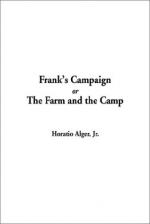By this time they had come within sight of the schoolhouse.
“There comes the young farmer,” said John Haynes, in a tone which was only subdued lest the teacher should hear him, for he had no disposition to incur another public rebuke.
A few minutes later, when Frank was quietly seated at his desk, a paper was thrown from behind, lighting upon his Virgil, which lay open before him. There appeared to be writing upon it, and with some curiosity he opened and read the following:
“What’s the price of turnips?”
It was quite unnecessary to inquire into the authorship. He felt confident it was written by John Haynes. The latter, of course, intended it as an insult, but Frank did not feel much disturbed. As long as his conduct was approved by such persons as his teacher and Mrs. Chester, he felt he could safely disregard the taunts and criticisms of others. He therefore quietly let the paper drop to the floor, and kept on with his lesson.
John Haynes perceived that he had failed in his benevolent purpose of disturbing Frank’s tranquillity, and this, I am sorry to say, only increased the dislike he felt for him. Nothing is so unreasonable as anger, nothing so hard to appease. John even felt disposed to regard as an insult the disposition which Frank had made of his insulting query.
“The young clodhopper’s on his dignity,” he muttered to himself. “Well, wait a few months, and see if he won’t sing a different tune.”
Just then John’s class was called up, and his dislike to Frank was not diminished by the superiority of his recitation. The latter, undisturbed by John’s feelings, did not give a thought to him, but reflected with a touch of pain that this must be his last Latin recitation in school for a long time to come.
CHAPTER IX. THE LAST EVENING AT HOME
Three weeks passed quickly. October had already reached its middle point. The glory of the Indian summer was close at hand. Too quickly the days fled for the little family at the farm, for they knew that each brought nearer the parting of which they could not bear to think.
Jacob Carter, who had been sent for to do the heavy work on the farm, had arrived. He was a man of forty, stout and able to work, but had enjoyed few opportunities of cultivating his mind. Though a faithful laborer, he was destitute of the energy and ambition which might ere this have placed him in charge of a farm of his own. In New England few arrive at his age without achieving some position more desirable and independent than that of farm laborer. However, he looked pleasant and good-natured, and Mr. Frost accounted himself fortunate in securing his services.
The harvest had been got in, and during the winter months there would not be so much to do as before. Jacob, therefore, “hired out” for a smaller compensation, to be increased when the spring work came in.




